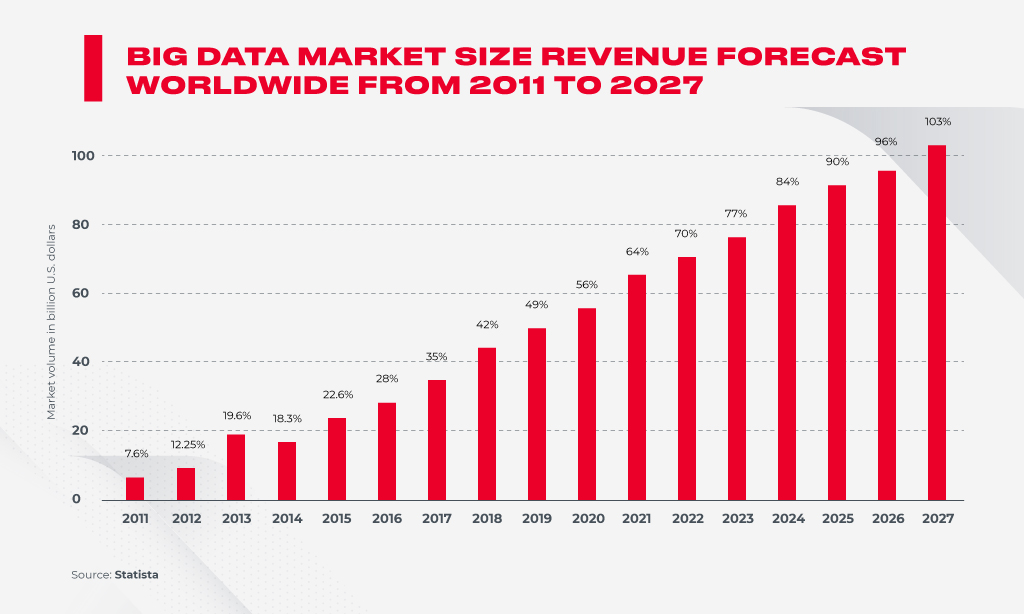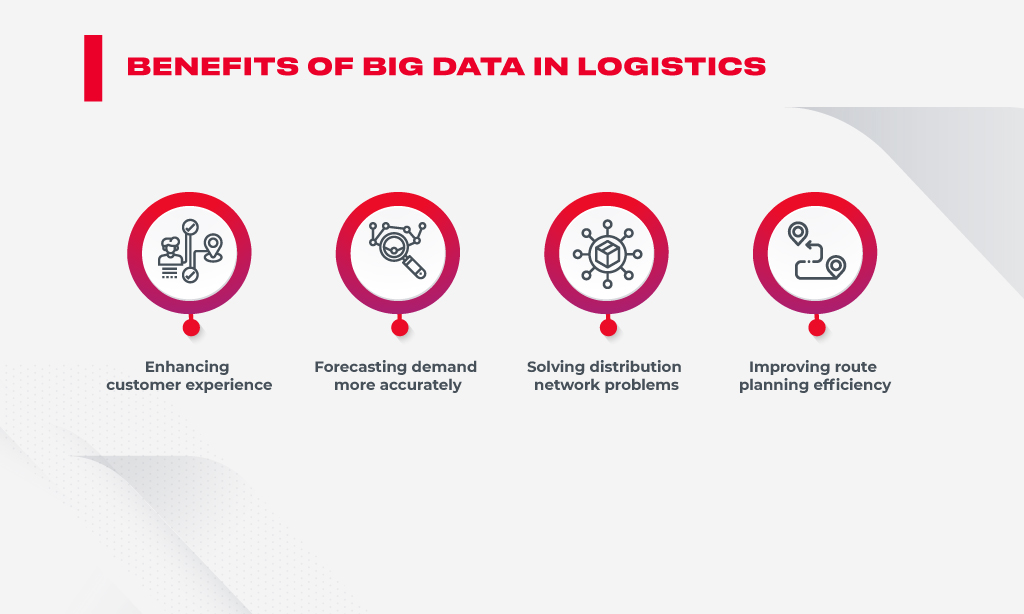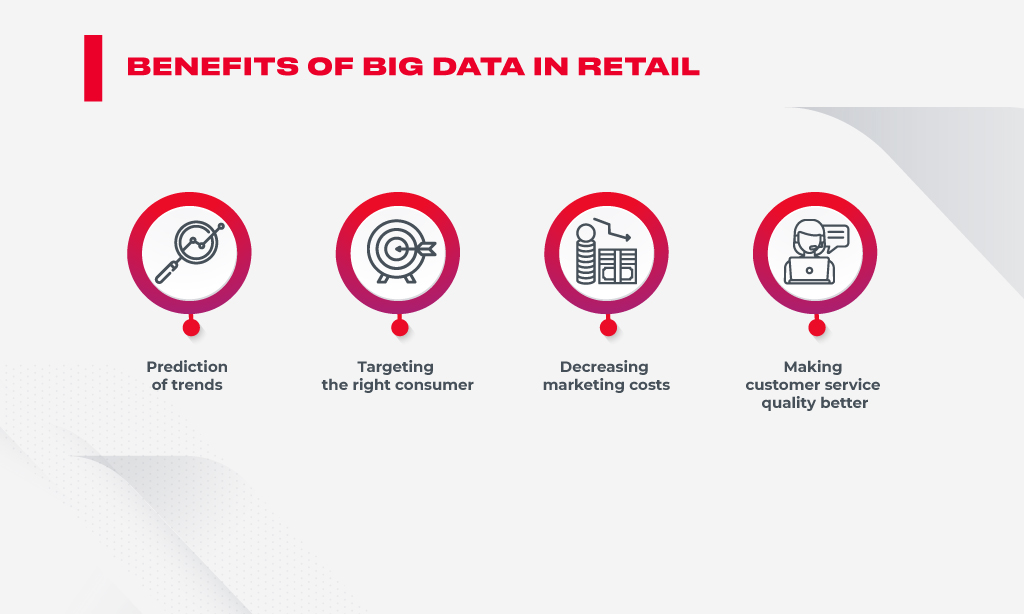Pros and Cons of Big Data: Solutions To Empower Your Business
Digital tracking has become common in everyday life. Enterprises have become aware of the pros and cons of big data and use them for industry needs.
People answer all sorts of questions on their smartphone, like “What trendy things are going on sale,” “What’s happening in the world?”. They can decide to buy a Halloween costume, or make an appointment with a doctor.
Big corporations, middle-size businesses, and commercial institutions come across challenges, such as big data validation, security, and solution development. Let’s explore some of these in facts and numbers.
What Is Big Data
A huge amount of the information that’s gathered on a daily basis can be converted into smart knowledge. Analytics help to collect and optimize it in accordance with the specific industry needs.
National Geographic has shared the following facts and figures through its documentary series, Explorer:
- Acxiom has 1500 pieces of information on every consumer. They use analytics and bundle the gathered information into personal profiles with catchy names such as “Man in Trouble.” This file is made up of profiles for married men who’ve recently searched for flowers and chocolates.
- Pennsylvania Institute researchers revealed that 91% of the websites where people look up medical symptoms are sharing information with third parties, even to the banks.
- acebook algorithms know a person better than his or her spouse (they can predict sexual preferences profile with 88% accuracy).
Let’s see whether big data is always only about advantages and how it can possibly be more intelligent.
Pros and Cons of Big Data
The market size of big data is constantly growing. Considering its revenue forecast, this fact is not surprising.

Moreover, big data provides businesses with a number of advantages, including:
- cutting costs (e.g., in logistics, a company can optimize fuel consumption and routes to save money);
- increasing business efficiency (warehouse management in retail);
- improving pricing (research your target audience and meet their pricing demands better);
- the possibility to compete better on the market (arrange competitor surveys);
- boosting sales and loyalty (analysis helps you to target specific niches and craft customer journey more precisely, thinking about buyer’s pains and gains);
- hiring the right employees (tracking applicants or growing employment channels).
Until it’s been processed, all we have is unstructured information. To gain insight, to develop a solution, and to get a profit, the business must analyze information in its entirety and manage the risks wisely.
Here are 5 challenges that are often turned into cons if enterprises fail to deal with them correctly. They can influence productivity, outcomes, and even company reputation.
- Unrecognized statistics. Once you get knowledge (both from online and offline sources), it is necessary to structure it and make sense of the received pieces.
- Data storage. The information requires space and infrastructure to be stored, hence, companies should choose either to invest in high-tech servers or to develop cloud solutions.
- Cost-effectiveness. Big data can boost revenue as well as become a source of spendings. Making cost-effective management available for small and medium businesses is an outstanding future challenge.
- Poor quality professional analytics convert information bytes into rubbish.
- Security. Enterprises spend greatly to prevent breaches or any fraudulent activities with customer profiles. Kaspersky IT security calculator presents +11% in comparison to the 2019 average spendings as expected growth of the IT security budget till 2022.
To turn risks into benefits, businesses must develop solutions, design clear roadmaps, and apply the right technology, which is possible via consulting services provided by Innovecs as well.
Sometimes, the cons of big data (e.g. incompetent up-to-date analytics) can result in accidents, as it was in a well-known Enron case.
According to Kaspersky’s annual 2019 report, IT security budgets vary from 8.9 million dollars up to 18.9 million dollars in accordance with. The same report gives information that security breaches cost an average of 1.41 million dollars. So, ongoing monitoring of breaches preserves not only company reputation, but money as well.
Big Data Analytics and Applications
Knowing the advantages and disadvantages of big data, one learns how information capturing, collecting, and processing empowers the business and the goals of applications and analytics.

Big data applications make banking and securities, media and entertainment, insurance and healthcare, and manufacturing and logistics perform better, avoid risks, and increase revenues.
With applications for different industries, analytics make use of:
- Web server logs
- Internet clickstream info
- Social media content
- Network activity reports
- Customers’ emails texts
- Survey responses
- Mobile phone records
- Machine data collected by sensors
States can learn how the electorate is responding to certain government actions. Social media analytics can give valuable real-time insights into how the market responds to new products and services. In agriculture, specialists pick sensor data to boost the crops.
It is obvious: gathering information is just half of the puzzle; the most important challenge is to analyze and categorize.
Benefits of Big Data in Different Industries
Variable and complex statistics, having its own pros and cons, being analyzed due to high quality applications weighs heavily for every industry nowadays. Let’s explore the most vivid benefits in logistics, healthcare, and retail.
Benefits of Big Data In Logistics
Big data application development contributes to logistics and supply chain substantially.
It can significantly transform the supply chain by:
- fastening delivery;
- giving customers, shippers, and carriers more transparency;
- routes optimization;
- shipping sensitive goods quicker;
- automation.
All of the benefits mentioned above target customer satisfaction, operational process improvements, and business running cost management.

Benefits of Big Data In Healthcare
Healthtach software development has been digitizing the industry in the form of the Internet of Medical Things and artificial intelligence, making predictions and personalized patients’ care. Big data applications in healthcare are presented as EHR (electronic health records) for monitoring patients’ profiles, easing hospital management, and making disease curing more efficient.
And, as it is presented by the Health IT Dashboard, people are getting more confident in medical data security for the last few years. In 2011, 75% of patients were sure that information was protected from unauthorized viewing. In 2017, this number reached 84%. Once users trust big data, medical institutes will implement it more widely.
Machine learning algorithms and data scientists are involved in processing medical data, excluding human factor influences.

Benefits of Big Data In Retail
It’s worth focusing on trendy issues such as sales analytics, store (warehouses) planning, and data management.
Rapidly processed statistics in retail gives the possibility to minimize costs and errors, to plan marketing, accelerate in-house operations, and better meet customer’s needs.

Let’s explore more: useful information can be found surfing the net under hashtag #LetsTalkBigData.
Innovecs Expertise in Big Data Solutions
Innovecs has considerable experience in consultancy and the development of solutions. Our collaboration with one ad company to design real-time analysis solutions of video content from scratch is a good example of our expertise in the field.
A solid professional team was formed to develop a video engine for analyzing video content and recognizing celebrities, sports teams, and other key items.
The engine was able to analyze content due to NLP and ML algorithms applied. It can identify safe and unsafe content, excluding drugs, nudity, profanity.
To share video content produced by the engine, a video player was designed. Publishers and media owners can incorporate the player into their website as a ready-to-use solution.
Engine’s innovative, error-free solutions backed with advanced technologies proved the Innovecs team is skillful, experienced, and able to manage challenging projects.
Conclusion: the Future of Big Data
Big data is a powerful tool and is easing a number of things in different industries. We are at the beginning of a revolution that will touch every business. Even small businesses are getting involved and applying more and more big data applications.
Forbes has published a list of facts that prove big data future potential:
- The exploding volume of information makes people react, deal with it, and manage it. More data has been produced over the last 2 years than in the entire history of the human race.
- By the end of 2020, 1.7 megabytes of information will be stored every second for every person on the planet.
- Gathered digital space will grow from 4.4 zettabytes to 44 zettabytes, which is 10 times more.
- Google has 40 000 search requests every second.
- Facebook users interact with 31.25 million messages on average and watch 2.77 million videos every minute.
- More than 90% of the photos are taken on smartphones and shared online immediately.
- There are 50 billion smart devices connected to the internet.
To capture, collect, and store all the volume of information mentioned above, companies will need to indulge in more and more sophisticated solutions, building them with Innovecs to get benefits of analytics.
Using our expertise, business owners can make their strategies benefit greatly from analyzed and visualized content, discovered patterns, and proposed analytical models, making informed decisions and minimizing risks.